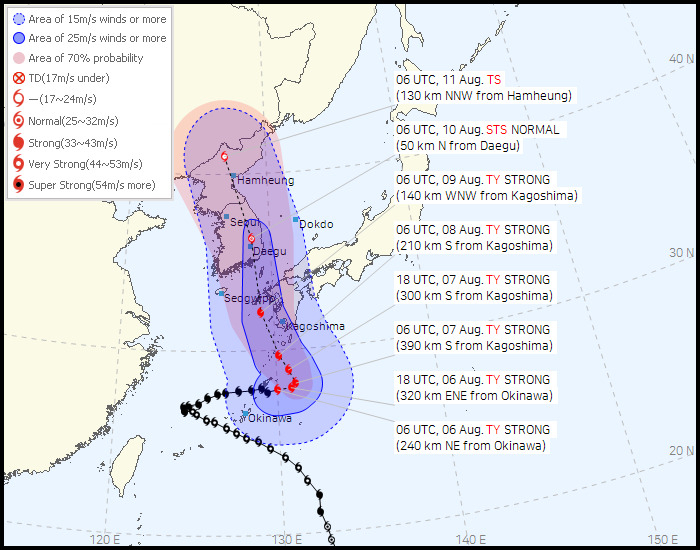 |
Typhoon Khanun's predicted path (KMA) |
A typhoon that left three people dead in Japan last week and meandered in the region for days is expected to head toward South Korea this week, likely making landfall on the east coast Thursday, the national weather agency said Sunday.
As of 9 a.m. Sunday, Typhoon Khanun passed 180 kilometers off Japan's southernmost Okinawa Islands, making its way toward reaching Kyushu -- the southernmost of Japan's four largest islands -- by Monday, according to the Korea Meteorological Administration.
After passing through Japan, the sixth typhoon of the year is projected to head northward toward the East Sea and hit inland areas 50 kilometers north of Daegu at 3 p.m. Thursday.
By the time it reaches South Korea, its intensity is expected to ease to medium strength, with wind speeds of about 25 meters per second.
The typhoon will then continue its northward trajectory towards North Korea, and it is anticipated to pass through the northern city of Hamhung.
The KMA added that while Khanun’s trajectory is still subject to change, all of South Korea could see strong winds and rains from the middle of the week, with Busan, Ulsan and South Gyeongsang Province under its direct influence on Wednesday and Thursday.
Following record monsoon rains last month, the relentless heat wave has persisted, as Typhoon Khanun has been adding more heat to the peninsula, which is already under the influence of the hot and humid North Pacific High and Tibetan anticyclone.
South Korea's urban and coastal areas -- including Seoul, Incheon, Gangneung in Gangwon Province, Busan, and the southern regions -- have been experiencing tropical nights, in which nighttime temperatures remain at 25 degrees Celsius or higher between 6 p.m. and 9 a.m. the next day. Two consecutive "super tropical nights," where the nighttime temperature stayed over 30 degrees C, were reported last week in Gangneung.
As of 8 a.m. on Sunday, temperatures were already high, with Seoul and Gwangju at 29.1 C, Incheon and Daejeon at 28.1 C, Daegu at 29.2 C, Ulsan at 30.8 C and Busan at 31.2 C.
Amid the serious-level heat wave advisories issued for many parts of the nation, daily high temperatures will range from 31 C to 37 C. The highest daily temperatures are forecast to peak at 35 C in Seoul, 36 C in Daegu and 37C in Andong, North Gyeongsang Province.







![[Today’s K-pop] Blackpink’s Jennie, Lisa invited to Coachella as solo acts](http://res.heraldm.com/phpwas/restmb_idxmake.php?idx=644&simg=/content/image/2024/11/21/20241121050099_0.jpg)